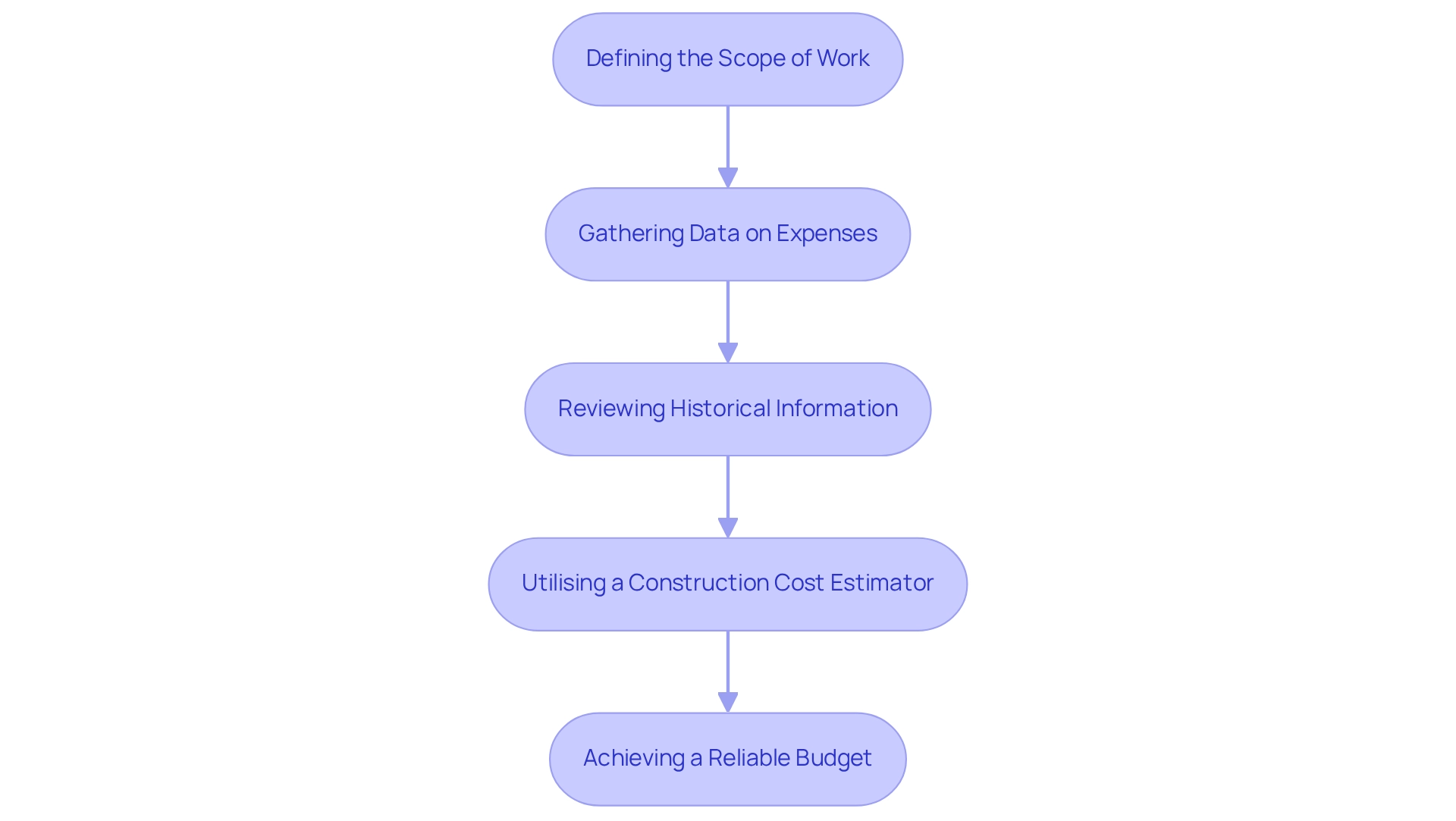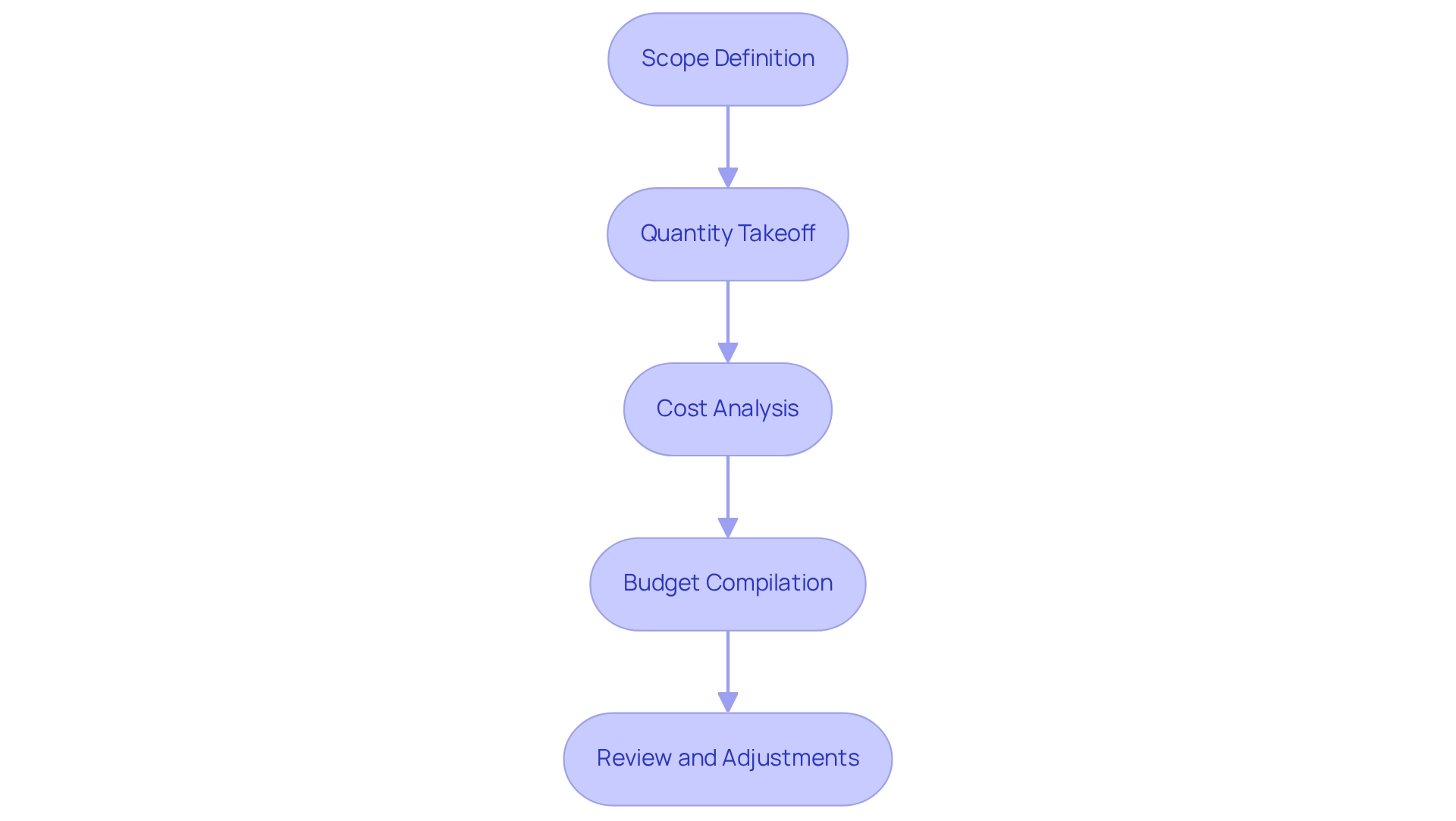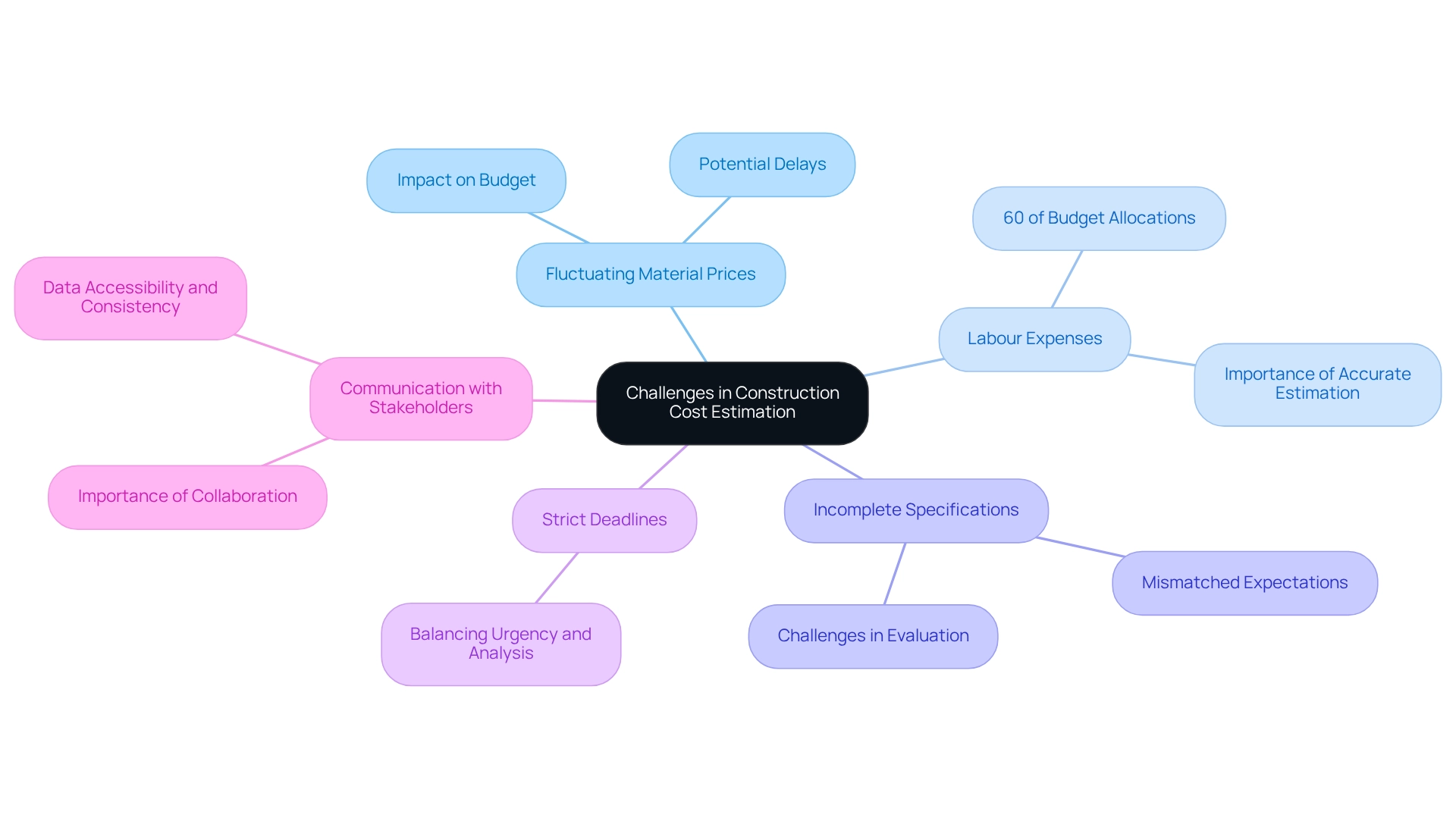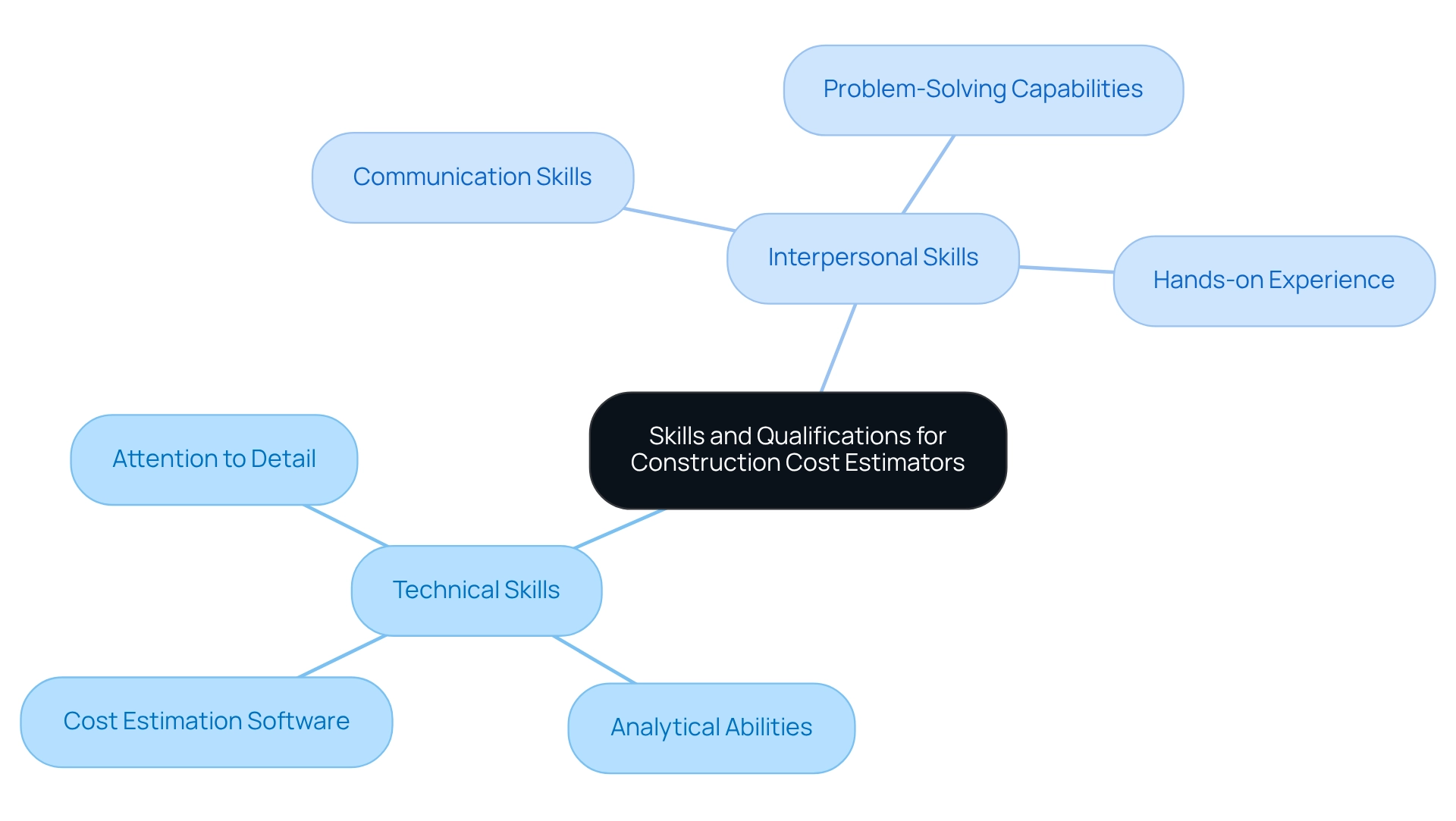10 Apr 2025
BlogOverview
A construction cost estimator is a professional tasked with predicting the financial resources essential for building projects, which includes both direct and indirect expenses. This role is critical for assessing project feasibility and ensuring success. Accurate cost estimation is not merely beneficial; it is vital for maintaining budgetary control, mitigating financial risks, and enabling informed decision-making among stakeholders. This is particularly important in today’s recovering construction market, where financial prudence can significantly impact outcomes.
Introduction
In the intricate world of construction, the ability to accurately estimate costs is crucial, it’s a factor that can determine the success or failure of a project. As the industry contends with fluctuating material prices, advancing technologies, and rising demands for sustainability, the importance of construction cost estimators has reached unprecedented levels.
This article explores the essential processes of cost estimation, emphasising the critical role precise budgeting plays in ensuring project viability and success. By examining common challenges, innovative tools, and the skills necessary for aspiring estimators, we illuminate how effective cost management fosters smoother project execution and enhances stakeholder satisfaction.
As the construction landscape continues to evolve, grasping the nuances of cost estimation becomes essential for navigating this complex field.
Defining Construction Cost Estimation
Estimating costs for building projects is a critical procedure that a construction cost estimator undertakes to forecast the financial resources required to complete a development initiative. This encompasses both direct expenses, such as materials and labour, and indirect expenses, including overhead and contingencies. At Edmond Shipway, a construction cost estimator plays a pivotal role in this process by meticulously considering all potential expenses to formulate a comprehensive budget.
This fundamental understanding is vital for stakeholders, empowering them to make informed decisions throughout the lifecycle of the project.
The importance of a construction cost estimator for accurate cost assessment cannot be overstated, particularly in the management of projects. It serves as a guiding framework that influences viability, funding, and overall success. In 2024, the value of new building activity in Great Britain reached a record high of £133,000 million, reflecting a robust recovery in the sector despite challenges such as rising insolvencies and fluctuating price indices.
This growth underscores the necessity of precise financial assessment procedures, such as those provided by a construction cost estimator, to navigate the complexities of the construction environment, especially in a recovering market where accurate budgeting can significantly impact project feasibility.
Current statistics indicate that an effective construction cost estimator is essential for maintaining budgetary control and mitigating financial risks. The Construction Output Price Indices, compiled using input expenses, serve as a proxy for output prices, providing valuable insights into market trends. As the Construction Products Association forecasts a 2.2% decline in building output for 2024, the role of the construction cost estimator at Edmond Shipway becomes increasingly crucial in ensuring projects remain financially viable during downturns.
Effective examples of building expense assessment highlight its impact on outcomes. For instance, projects that employed stringent budgeting practices reported fewer financial overruns and enhanced stakeholder satisfaction. The expense assessment process typically involves several key steps:
- Defining the scope of work
- Gathering data on expenses
- Reviewing historical information
- Utilising a construction cost estimator to achieve a reliable budget
In budgeting for projects, the construction cost estimator at Edmond Shipway plays a vital role by providing detailed breakdowns of expenses, which are essential for securing funding and managing resources effectively. Statistics suggest that projects with a construction cost estimator delivering clearly defined financial estimates are more likely to stay within budget, highlighting the importance of this role in the overall project management framework.
As the construction sector evolves, current trends in pricing analysis involve the integration of advanced technologies and software tools that enhance precision and efficiency. At Edmond Shipway, these innovations are revolutionising traditional assessment methods, facilitating real-time data analysis and improved forecasting capabilities. By embracing these trends, estimators can better support managers in achieving successful outcomes.

The Importance of Accurate Cost Estimation in Construction Projects
A construction cost estimator plays a crucial role in precise financial assessment during building projects, significantly influencing feasibility, funding, and overall success rates. Statistics indicate that a staggering 98% of construction projects face financial overruns or delays, highlighting the urgent need for enhanced management and budgeting practices. Incorrect estimates provided by a construction cost estimator can lead to serious consequences, including budget overruns, delays in tasks, and significant financial losses.
Historical data emphasises that typical challenges, such as unexpected site conditions and insufficient management, often arise from flawed financial evaluations, which can disrupt timelines and reduce stakeholder satisfaction. The involvement of a construction cost estimator is critical, as construction budget overruns signify the most significant issue confronting all stakeholders engaged in an initiative, further underscoring the essential requirement for efficient financial forecasting.
A well-prepared construction cost estimator not only assists developers in securing necessary financing but also facilitates effective cash flow management. This financial foresight is essential, as it enables the allocation of resources in a manner that aligns with objectives.
Moreover, clear budgeting practices cultivate trust among stakeholders, improving communication and cooperation throughout the lifecycle. To achieve effective expense control in construction endeavours, utilising a construction cost estimator along with strategies such as material management, resource planning and management, and proper financial oversight is essential for alleviating risks linked to budget overruns.
Successful funding examples demonstrate the beneficial results of precise budget analysis performed by a construction cost estimator. Projects employing a construction cost estimator to adhere to precise budgeting practices often experience smoother execution and higher satisfaction rates among clients and stakeholders. For instance, in the case studies of Edmond Shipway’s participation in civic and heritage initiatives, careful budgeting procedures resulted in successful completions within financial limits and on time, highlighting the concrete advantages of their expertise.
Furthermore, Edmond Shipway’s involvement in high-value commercial projects, further emphasises the financial consequences of budget overruns, which can be significant, resulting in strained relationships and possible cancellations. Thus, the significance of a construction cost estimator in achieving precise financial forecasting cannot be overstated; it is a fundamental component that affects not only the economic well-being of an initiative but also its overall achievement.
The Construction Cost Estimation Process: A Step-by-Step Guide
The construction cost estimator procedure is a vital element of successful management, involving several important steps that guarantee accuracy and dependability. These steps include:
- Scope Definition: This initial phase involves a thorough understanding of the requirements and objectives. Clearly defining the scope helps in identifying all necessary tasks and resources, setting the foundation for accurate estimates.
- Quantity Takeoff: In this step, estimators meticulously measure and quantify the materials and labour required for the project. This procedure is vital, as it establishes the foundation for later financial estimations and ensures that the construction cost estimator does not overlook any critical elements.
- Cost Analysis: Estimators conduct extensive research on current market prices for materials and labour. This analysis not only includes direct expenses but also considers indirect and overhead expenditures, which are essential for creating competitive and profitable bids. A construction cost estimator utilises job costing information from previous projects along with a thorough comprehension of indirect and overhead expenses to formulate estimates and submit bids that are both competitive and lucrative. Leveraging this data enhances the accuracy of these estimates.
- Budget Compilation: After gathering all necessary data, the next step is to integrate these costs into a comprehensive budget. This budget acts as a financial plan for the initiative, directing expenditure and resource distribution throughout its lifecycle.
- Review and Adjustments: The final step involves revising estimates based on feedback from stakeholders and any changes in scope or conditions. This iterative process is essential for maintaining accuracy, as it allows for adjustments that reflect real-time developments in the endeavour. It is also important to handle opportunities and material risks separately in cost estimates to avoid distortion and ensure proper reporting.
By following this systematic approach, building experts can use a construction cost estimator to create more reliable budgets that align with the unique requirements of each project. It is also important to validate every estimate using various data sources and to apply professional judgement to ensure that the estimates are both sensible and grounded in experience. For instance, construction estimators often add a contingency of 5-10% to the contract price to account for unforeseen circumstances, further enhancing the robustness of the budget.
Including real-world examples and case studies, such as the study named ‘Pricing the Estimate,’ demonstrates the practical application of modifying base expenses to reflect local labour rates and material prices. This not only assists in comprehension but also emphasises the significance of flexibility in the assessment process, ensuring that initiatives stay on course and within financial limits.

Common Challenges in Construction Cost Estimation
Construction cost estimators face numerous challenges that significantly impact the outcomes of their projects. Fluctuating material prices emerge as a particularly critical concern. Notably, labour expenses typically account for approximately 60% of budget allocations, underscoring the necessity for precise labour expense estimation to maintain profitability.
Unexpected increases in material costs can disrupt even the most meticulously planned budgets, leading to potential delays and increased financial strain.
In addition to material price fluctuations, incomplete specifications pose another significant hurdle. When project details are unclear or insufficient, estimators struggle to provide accurate evaluations, which can create mismatched expectations between clients and contractors. Furthermore, strict deadlines exacerbate these challenges, compelling estimators to balance the urgency of timelines with the need for thorough analysis.
Effective communication and collaboration with stakeholders are essential for navigating these complexities. A recent survey of 106 contractors and consultants revealed that the type and nature of the undertaking are the most critical factors influencing estimation accuracy, closely followed by the number of bidders and project location. This finding highlights the importance of gathering comprehensive data and maintaining open lines of communication to ensure data accessibility and consistency.
The challenge of collecting data from diverse sources further emphasises the necessity for effective coordination among all parties involved.
To illustrate the impact of changing material prices, consider a case study focused on labour expenses. By examining the time required for tasks and factoring in current wages, estimators can generate more accurate labour expenditure estimates, which are vital for profitability. This relationship between labour expenses and material price variations underscores the delicate balance that estimators must maintain.
Expert opinions affirm that “the process of creating a detailed financial estimate is essential for an endeavour to be considered successful upon completion.” Therefore, addressing these challenges directly is crucial for construction cost estimators aiming to deliver precise and reliable assessments.

Leveraging Technology: Tools and Software for Cost Estimation
The incorporation of technology in the role of a construction cost estimator has fundamentally transformed the industry, enabling more precise and effective planning. Instruments such as Building Information Modelling (BIM) and advanced estimating software empower construction cost estimators to achieve accurate quantity takeoffs and financial calculations, significantly enhancing project accuracy. For example, initiatives employing a collaborative BIM strategy have demonstrated a reduction of up to 5% in expenses compared to traditional methods, underscoring the financial advantages of embracing such technologies.
Edmond Shipway utilises a construction cost estimator that harnesses specialised estimating software, which provides real-time pricing updates and comprehensive historical data analysis. This capability allows estimators to make informed decisions swiftly, adapting to market fluctuations and ensuring competitive pricing. Furthermore, emerging developments in AI-driven expense assessment are set to further revolutionise the operations of construction cost estimators within the building environment.
Innovations such as natural language processing for interpreting project specifications and augmented reality for real-time financial predictions are paving the way for more sophisticated estimating practices.
The building sector is on the verge of a technological transformation, where AI and data analytics will redefine budgeting processes. The latest technology trends in building expense estimation have streamlined construction cost estimators’ procedures while also enhancing sustainability initiatives. By integrating environmental impact data into financial evaluations, Edmond Shipway can improve their projects for a Net Zero Carbon future, illustrating their commitment to sustainability consultancy.
As the building sector continues to evolve in 2025, embracing these technological advancements will be crucial for firms like Edmond Shipway aiming to maintain a competitive edge and meet the growing demands for efficiency and sustainability.
Skills and Qualifications for Aspiring Construction Cost Estimators
Aspiring construction cost estimators must cultivate a diverse skill set that seamlessly integrates both technical and interpersonal abilities. A foundational qualification typically includes a degree in construction management, civil engineering, or quantity surveying, providing the essential theoretical background. Mastery of cost estimation software is crucial for a construction cost estimator, enabling the development of precise and effective budgets.
Robust analytical abilities are vital for interpreting data and making informed decisions, while exceptional communication skills foster collaboration with various stakeholders throughout the project’s lifecycle.
Attention to detail is paramount, as even minor discrepancies in estimates can result in significant budget overruns. Problem-solving capabilities are equally essential for construction cost estimators, equipping them to navigate the complexities inherent in construction projects effectively. Hands-on experience gained through internships or junior roles is invaluable, offering insights into industry standards and the assessment process.

Future Trends in Construction Cost Estimation: What to Expect
The future of construction cost estimator practices is on the brink of a significant transformation, propelled by technological advancements and evolving industry demands. At Edmond Shipway, the integration of artificial intelligence (AI) is set to revolutionise predictive analytics, enabling our estimators to enhance precision and efficiency in their evaluations. AI-powered tools can scrutinise extensive datasets to forecast expenses with greater accuracy, significantly reducing the margin for error that has historically plagued the industry.
Moreover, the incorporation of sustainable practices into financial estimation is becoming increasingly vital. As the construction industry faces mounting pressure to comply with sustainability standards, our estimators are tasked with evaluating the financial implications of eco-friendly materials and methods. This shift not only aligns with global initiatives for a Net Zero Carbon future but also reflects a growing market demand for environmentally responsible construction.
Cloud-based estimating solutions are also gaining traction at Edmond Shipway, enabling real-time collaboration and data sharing among stakeholders. This technology empowers construction cost estimators to perform more precise and timely evaluations, which are crucial in an environment where delays and budget overruns can significantly impact profitability.
As the construction sector continues to embrace digital transformation, pricing professionals at Edmond Shipway must remain adaptable, embracing these new tools and methodologies. The industry’s capacity to adjust to an aging workforce, integrate new technologies, and attract fresh talent will be paramount in addressing the challenges of a rapidly evolving market. Staying abreast of emerging trends and technologies is essential for those aspiring to excel in this dynamic landscape.
The ongoing evolution of the construction cost estimator not only guarantees enhanced precision but also equips companies like Edmond Shipway to manage the complexities of contemporary building projects more effectively.
Conclusion
Accurate construction cost estimation is undoubtedly a cornerstone of project success, influencing everything from feasibility to stakeholder satisfaction. It is essential to recognise that precise budgeting not only mitigates financial risks but also fosters smoother project execution. The critical steps in the estimation process, including project scope definition, quantity takeoff, cost analysis, and budget compilation, collectively ensure that all potential expenses are accounted for, thus enabling informed decision-making.
The challenges faced by cost estimators, such as fluctuating material prices and incomplete specifications, underscore the complexities inherent in this vital role. However, by embracing technology, through tools like Building Information Modelling (BIM) and AI-driven estimating software, estimators can significantly enhance both accuracy and efficiency. As the industry evolves, integrating sustainable practices into cost estimation further emphasises the necessity of adapting to new demands and methodologies.
As the construction landscape continues to transform, the skills and qualifications required for aspiring estimators will be paramount. A combination of technical expertise, analytical abilities, and effective communication will equip them to navigate the intricacies of modern construction projects. Ultimately, the future of construction cost estimation is poised to be defined by innovation and adaptability, ensuring that firms can not only survive but thrive in an increasingly competitive environment. The emphasis on accurate cost estimation as a foundation for project viability cannot be overstated, reinforcing its role as a critical driver of success in the construction industry.
Share


